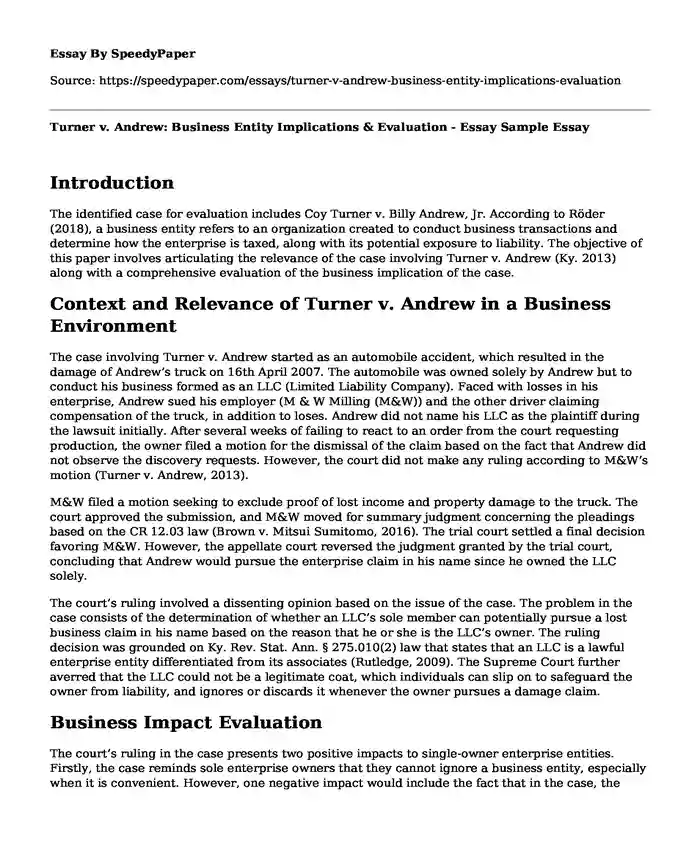Introduction
The identified case for evaluation includes Coy Turner v. Billy Andrew, Jr. According to Röder (2018), a business entity refers to an organization created to conduct business transactions and determine how the enterprise is taxed, along with its potential exposure to liability. The objective of this paper involves articulating the relevance of the case involving Turner v. Andrew (Ky. 2013) along with a comprehensive evaluation of the business implication of the case.
Context and Relevance of Turner v. Andrew in a Business Environment
The case involving Turner v. Andrew started as an automobile accident, which resulted in the damage of Andrew’s truck on 16th April 2007. The automobile was owned solely by Andrew but to conduct his business formed as an LLC (Limited Liability Company). Faced with losses in his enterprise, Andrew sued his employer (M & W Milling (M&W)) and the other driver claiming compensation of the truck, in addition to loses. Andrew did not name his LLC as the plaintiff during the lawsuit initially. After several weeks of failing to react to an order from the court requesting production, the owner filed a motion for the dismissal of the claim based on the fact that Andrew did not observe the discovery requests. However, the court did not make any ruling according to M&W’s motion (Turner v. Andrew, 2013).
M&W filed a motion seeking to exclude proof of lost income and property damage to the truck. The court approved the submission, and M&W moved for summary judgment concerning the pleadings based on the CR 12.03 law (Brown v. Mitsui Sumitomo, 2016). The trial court settled a final decision favoring M&W. However, the appellate court reversed the judgment granted by the trial court, concluding that Andrew would pursue the enterprise claim in his name since he owned the LLC solely.
The court’s ruling involved a dissenting opinion based on the issue of the case. The problem in the case consists of the determination of whether an LLC’s sole member can potentially pursue a lost business claim in his name based on the reason that he or she is the LLC’s owner. The ruling decision was grounded on Ky. Rev. Stat. Ann. § 275.010(2) law that states that an LLC is a lawful enterprise entity differentiated from its associates (Rutledge, 2009). The Supreme Court further averred that the LLC could not be a legitimate coat, which individuals can slip on to safeguard the owner from liability, and ignores or discards it whenever the owner pursues a damage claim.
Business Impact Evaluation
The court’s ruling in the case presents two positive impacts to single-owner enterprise entities. Firstly, the case reminds sole enterprise owners that they cannot ignore a business entity, especially when it is convenient. However, one negative impact would include the fact that in the case, the court failed to entirely make its ruling based on the possibility of enabling enterprise owners to discount their entities. However, the case makes it crucial for the sole owners to work with lawyers in identifying the most appropriate business entity initially, in addition to making essential follow-ups during the growth of the business to determine any necessary business forms of operation. The other disadvantage includes the fact that the court’s decision was against the business owner (Andrew). Nonetheless, the final decision presents a second advantage, including the crucial recognition that the safeguards LLCs offer applies to sole owners (Turner v. Andrew, 2013).
The selected organization includes Andrew’s truck enterprise, which is an LLC form of business entity. In particular, the court’s decision that Andrew, along with his LLC, was illegally interchangeable, implies that another party cannot penetrate the LLC’s veil to attain the sole owner’s possessions solely since the owner is the only member of the firm (Turner v. Andrew, 2013). The case implicates LLCs in the manner that the executive team is required to take appropriate actions, which separate their legitimate entity from themselves, in addition to other commodities. By doing so, the LLC owners will avoid veil-piercing and control over their assets by third parties. Lvov (2017) noted some fundamental steps, which include; observing entity formalities, separating assets, ensuring sustained insurance and capitalization of the business entities, as well as conducting the entity’s business operations under their names as opposed to the terms of the owners.
Conclusion
This paper has expressed the relevance of Turner’s case, in addition to evaluating its business implication to the executive team that manages LLCs. This essay has determined that based on the analysis of the case, LLCs owners can avoid veil-piercing and control over their assets by third parties through observing entity formalities, separating assets, and conducting the entity’s business operations under their names.
References
Lvov, A. M. (2017). Preserving Limited Liability: Mitigating the Inequities of Reverse Veil Piercing with a Comprehensive Framework. UC Davis Bus. LJ, 18, 161. Url: https://heinonline.org/HOL/LandingPage?handle=hein.journals/ucdbulj18&div=7&id=&page=
Röder, E. (2018). Combining Limited Liability and Transparent Taxation: Lessons from the Convergent Evolution of GmbH & Co. KGs, S Corporations, LLCs, and Other Functionally Equivalent Entities. Florida Tax Review, 21(2), 762-843. Url: https://search.proquest.com/openview/44c4078f8aa72d9352efae9f30824c36/1?cbl=44999&pq-origsite=gscholar
Rutledge, T. E. (2009). Again, For the Want of a Theory: The Challenge of the Series to Business Organization Law. Am. Bus. LJ, 46, 311. Url: https://heinonline.org/HOL/LandingPage?handle=hein.journals/ambuslj46&div=16&id=&page=
Cite this page
Turner v. Andrew: Business Entity Implications & Evaluation - Essay Sample. (2023, Nov 28). Retrieved from https://speedypaper.com/essays/turner-v-andrew-business-entity-implications-evaluation
Request Removal
If you are the original author of this essay and no longer wish to have it published on the SpeedyPaper website, please click below to request its removal:
- Report on Having Full-Time Workers
- Essay Sample on Strategy: Coca Cola Company
- Essay Sample: Creating a More Human Working Place
- Paper Example. Trade War Between the United States and China
- Investment Project to Start After Completion of Schooling. Free Essay
- Wal-Mart: Business Impact of Political & Legal Environment - Essay Sample
- Importance of Writing Business Proposal - Essay Sample
Popular categories





